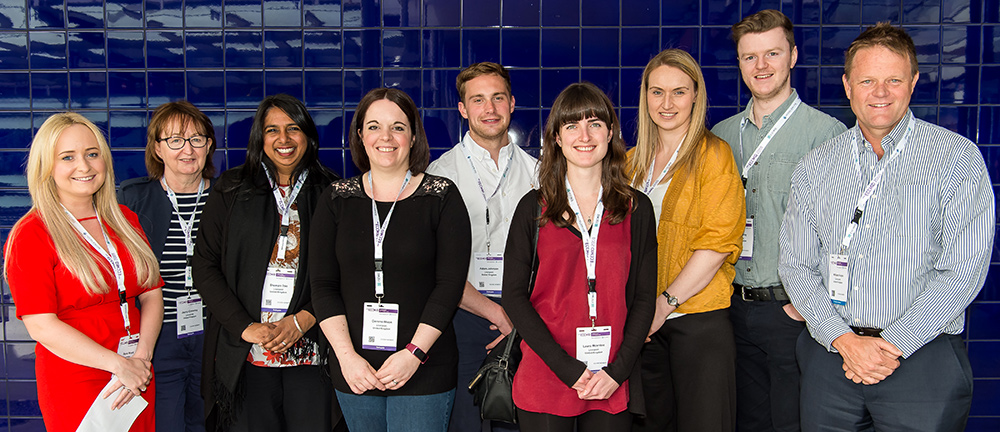
Antimicrobial Pharmacodynamics and Therapeutics (APT) Group
News
Latest news from @APTlivuni
We are recruiting a Software Developer to join our team. This position will support the Principal Investigators, Professor Iain Buchan and Professor William Hope, in creating and leading a local network for research and capacity strengthening on optimising antibiotic treatment. Closing date: Tuesday 16 April
ASM-ESCMID Conference, Boston 2023
Members of the APT team attended the 2023 ASM/ESCMID Joint Conference on Drug Development to Meet the Challenge of Antimicrobial Resistance, 19 – 22 September at the Sheraton Hotel, Boston.
Prof Shampa Das, Co-Chair of ESCMID-ASM Joint Conference Committee chaired two sessions:
- The Impact of Different Approaches to Breakpoints
- Young investigator session
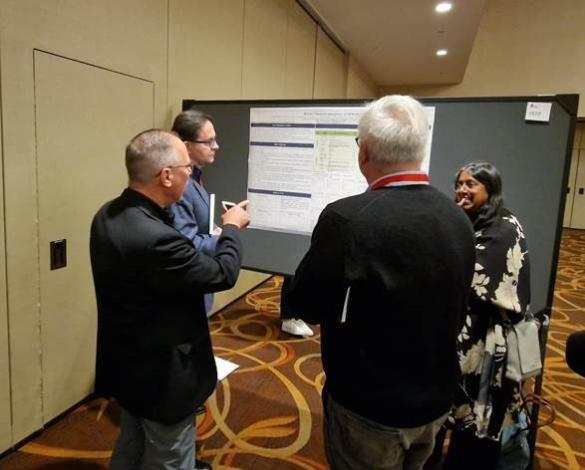
Dr Kat Stott gave a presentation on “Access to Antifungals in LMIC”.
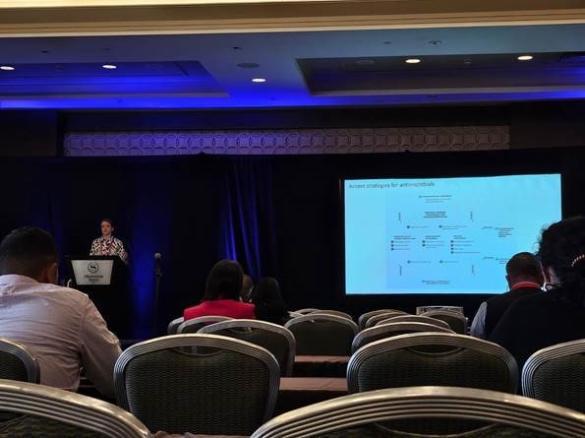
Nikki Farrington presented three posters during the conference:
- Presentation 1: PK-PD of new broad-spectrum agent BWC0977
- Presentation 2: Development of a Rabbit Model of Nosocomial Pneumonia to Combat Emergence of Resistance
- Presentation 3: Pharmacokinetic-Pharmacodynamic assessment of oral pro-drug avibactam in combination with ceftibuten against multi-drug resistant Enterobacterales in the murine thigh infection model
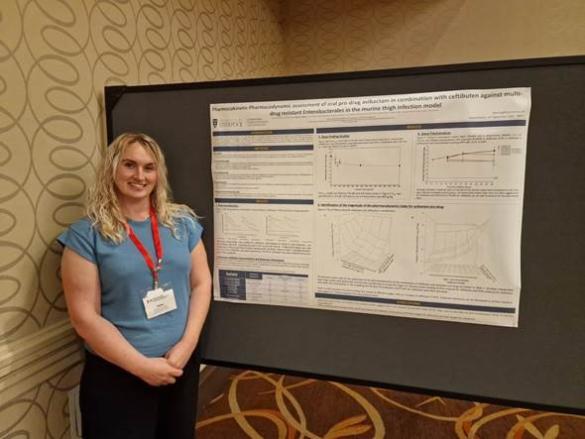
Vineet Dubey presented his research on Pseudomonas aeruginosa associated with high rate of morbidity and mortality in nosocomial pneumonia.
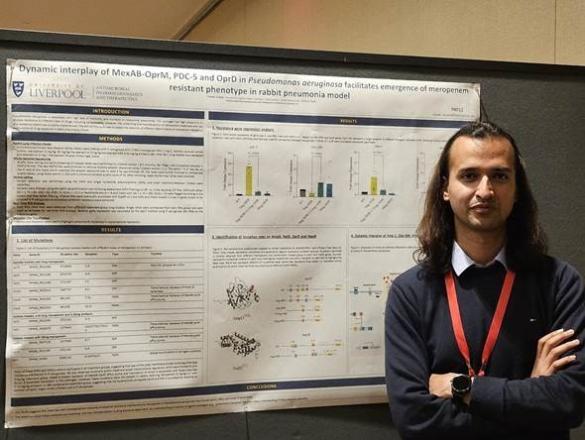
European Congress of Clinical Microbiology & Infectious Diseases (ECCMID) 2023
Members of the APT Team are in attendance at the European Congress of Clinical Microbiology & Infectious Diseases (ECCMID) Copenhagen, Denmark 15 - 18 April 2023.
Symposia
16 April - Session: Fairytales or reality, checking some eminence paradigms for treatment of severe infections 08:30 - 10:30
Professor Shampa Das 'Into the deep: can tissue penetration of antibiotics make the difference?'
16 April - Session: Therapy optimisation of antiviral drugs (Chaired by Dr Anne-Grete Martson) 13:30 - 14:30
17 April - Session: The use and misuse of MICs in patient management (Chaired by Professor Shampa Das) 13:30 - 14:30
17 April - Session: Success in managing CA-RTIs and reducing antimicrobial resistance: can both be achieved? 16:15 - 18:15
Professor Shampa Das 'How to optimise effective dose and enhance antibiotic longevity using PK/PD'
Poster sessions - 17 April
Adam Johnson will present his research with Pfizer, his poster is titled 'Pharmacokinetic/pharmacodynamic assessment of oral pro-drug avibactam in combination with ceftibuten against multidrug-resistant Enterobacteriaceae in the murine thigh infection model'.
Dr Anne-Grete Martson will present her research in collaboration with Bugworks Research Inc, her poster is titled 'K-PD of new broad-spectrum agent BWC0977'.
Update - Photos from (ECCMID) 2023
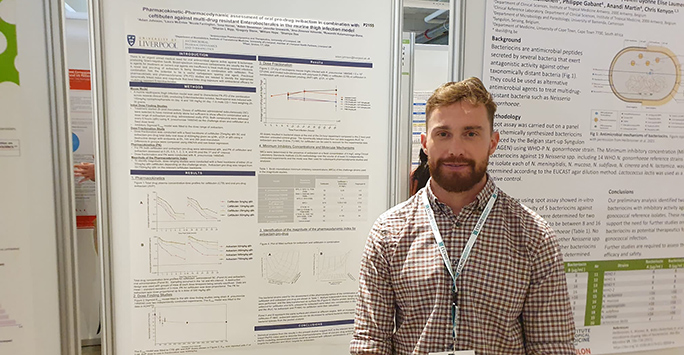
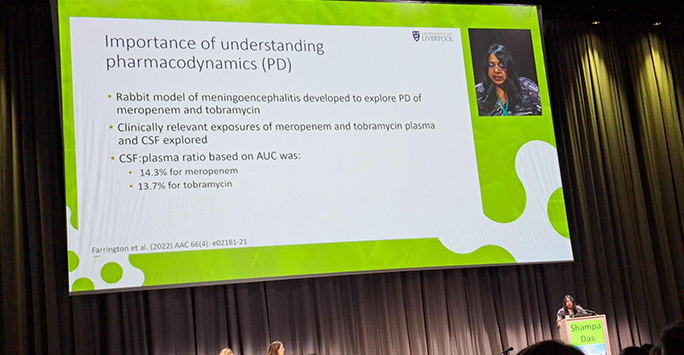
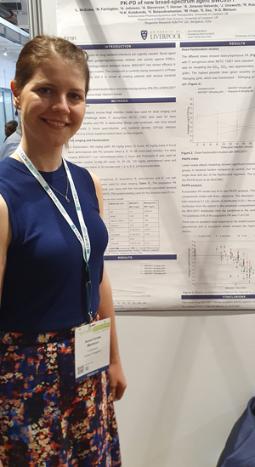
'Meet the (APT) Scientists' at the World Museum
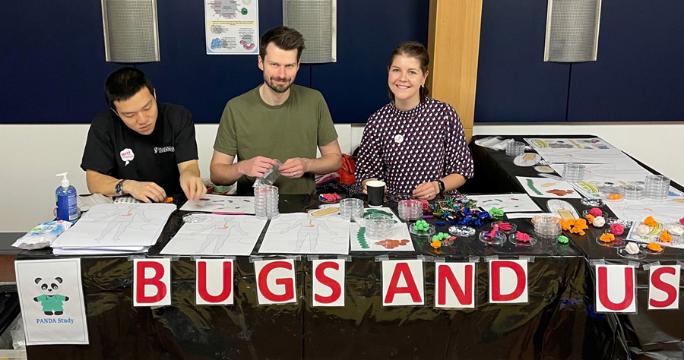
Members of the APT team took to the World Museum, Liverpool, 26 November for the first 'Meet the Scientists' event of the 2022/23 academic year.
'Meet the Scientists' is a series of interactive, hands-on science days for all the family run by the Faculty of Health and Life Sciences in partnership with the World Museum Liverpool. The events have been running for over seven years, are free to attend and each event is attended by between 600 – 1200 people from the local Merseyside area and beyond. Around half of attendees report it’s their first time attending a science event outside of school.
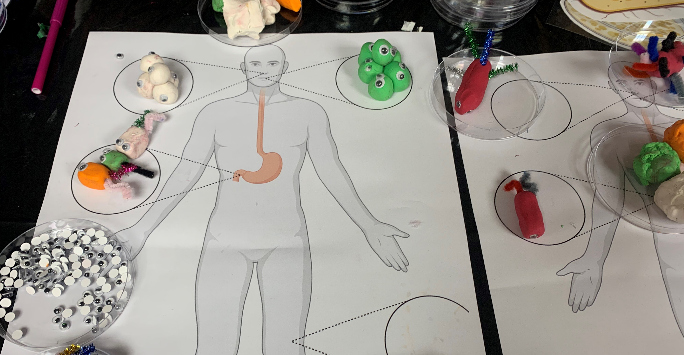
The APT stand 'Bugs and Us' explored the human body and the natural world where young people could craft their own bacteria to take home with them.
Find out more about Meet the Scientist events here.
Dr Anne-Grete Martson receives Fellowship from the Dutch Research Council NWO
Postdoctoral Research Associate Dr Anne-Grete Martson has been awarded a Fellowship for her project 'New methods to combat emerging viruses' in the Rubicon grants 2022 from the Dutch Research Council NWO.
On this page there is a list researchers awarded and also an overview of her project: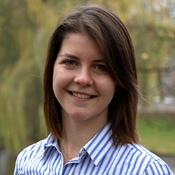
New methods to combat emerging viruses
Viruses with pandemic potential are continuously emerging. This project will use cytomegalovirus as a model to utilise a novel laboratory method to investigate emergence of resistance and viral killing. The method will provide new dosing regimens for cytomegalovirus treatment, and will be used to accelerate drug development for emerging viruses.
Dr Ishwar Singh speaks to The Biomedical Scientist
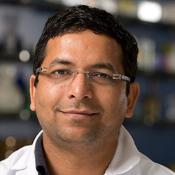 Revolutionary thinking - Dr Ishwar Singh believes that out-of-the-box thinking is important for scientific breakthroughs. It has certainly played a role in the latest research he has led, in which synthetic versions of the natural teixobactin molecule that can kill multi-drug-resistant bacterial pathogens, were designed and developed.
Revolutionary thinking - Dr Ishwar Singh believes that out-of-the-box thinking is important for scientific breakthroughs. It has certainly played a role in the latest research he has led, in which synthetic versions of the natural teixobactin molecule that can kill multi-drug-resistant bacterial pathogens, were designed and developed.
Read the full article here.
European Congress of Clinical Microbiology and Infectious Diseases (ECCMID) 2022
Members of the APT team presented at the ECCMID 2022 Conference Lisbon, Portugal April 23-26 2022.
Dr Nicola Farrington - Innovative preclinical PK/PD studies session - 'Pharmacodynamics of meropenem and tobramycin for neonatal meningoencephalitis: a novel approach to facilitate the development of new agents to address to address the challenge of antimicrobial resistance'
Dr Chris Darlow - Novel Combinations with potential to treat highly resistant pathogens session - 'Assessment of flomoxef and amikacin in a hollow-fibre infection model for the potential empiric treatment of neonatal sepsis in low-and middle-income settings'
Professor Shampa Das - EuCAST Educational Workshop session - 'PK/PK Breakpoints in the EuCAST breakpoint tables'
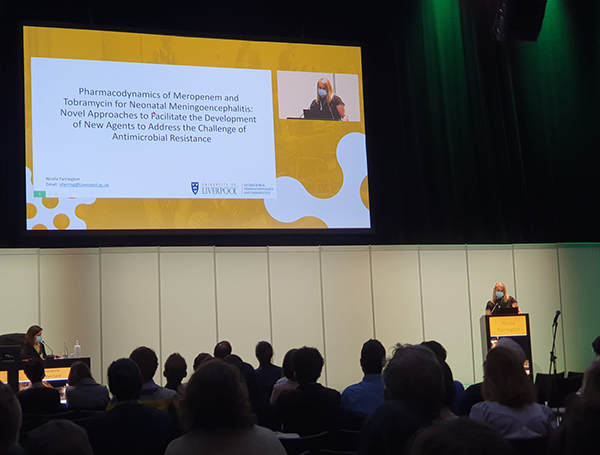
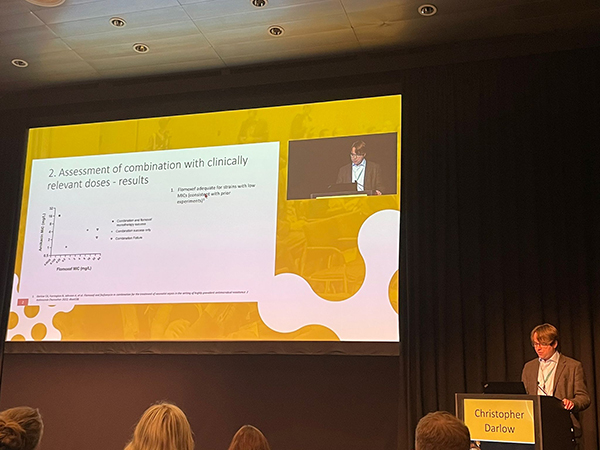
Liverpool scientists develop synthetic antibiotics that could save millions of lives
University of Liverpool scientists have taken a significant step towards unlocking the medical potential of a new class of potent antibiotic capable of killing ‘superbugs’ including MRSA without detectable resistance.
Lead Researcher, Dr Ishwar Singh, and the team developed simplified synthetic versions of the molecule teixobactin, used by producer bacteria to kill other bacteria in soil.
They have developed and tested a unique library of synthetic versions of the ‘game changing’ antibiotic, optimising key features of the drug to enhance its efficacy and safety, plus enabling it to be inexpensively produced at scale.
Joint conference on drug development to meet the challenge of antimicrobial resistance: December 8-9, 2021
The American Society for Microbiology (ASM) and the European Society for Clinical Microbiology and Infectious Diseases (ESCMID), host a Joint Conference on Drug Development to meet the challenge of Antimicrobial Resistance.
ASM/ESCMID Joint Conference will take place, online 8-9 December, 2021. An excellent programme for this year's meeting has been announced.
Further information about the conference and its programme can be found here.
Spero Therapeutics Submits New Drug Application to U.S. FDA for Tebipenem HBr for the Treatment of Complicated Urinary Tract Infections including Pyelonephritis
Spero Therapeutics, announces (28 October 2021) the submission of a new drug application (NDA) to the U.S. Food and Drug Administration (FDA), seeking approval for tebipenem HBr tablets for the treatment of complicated urinary tract infections (cUTI), including pyelonephritis, caused by susceptible microorganisms. If approved, tebipenem HBr would be the only oral carbapenem antibiotic available for use in cUTI. Read More.
Liverpool-led research centre to advance new treatments for cystic fibrosis infections
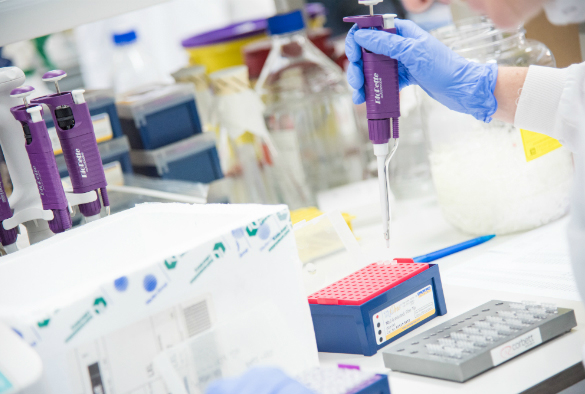
The University of Liverpool is leading a new international research collaboration to accelerate the development of much needed antibiotics for cystic fibrosis (CF) lung infections.
Supported by £750,000 of funding from the Cystic Fibrosis Trust and the CF Foundation in the United States, the Strategic Research Centre will develop new laboratory methods to make it quicker and easier for researchers to test new medicines for CF. Read More.
Dr Enas Newire has a new first author publication, entitled 'Identification of a Type IV-A CRISPR-Cas System Located Exclusively on IncHI1B/IncFIB Plasmids in Enterobacteriaceae'. https://www.frontiersin.org/articles/10.3389/fmicb.2020.01937/full
Tuesday 12 May 2020 | 4:00 PM - 5:30 PM BST
Global Antibiotic Research and Development Partnership (GARDP) REVIVE webinar presented by Dr Shampa Das "Probability of target attainment analyses for dose selection in antimicrobial drug development"
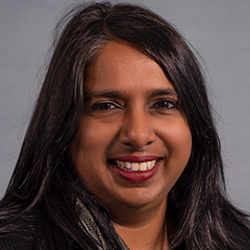
In this webinar, Shampa Das will give an overview of her work in studying the probability of target attainment for dose selection.
Topics discussed will include:
- An overview of what is meant by the probability of target attainment (PTA)
- How it is calculated and what data is used for this
- How PTA is used for decision making during drug development
The presentation will be followed by a Q&A session.
Dr Shampa Das was successfully awarded funding as part of the COVID-19 Strategic Research Funding Call, March 2020.
Working closely with other academics in the UoL and LSTM Covid-19 partnership & the University of Florida, the APT group have been funded to conduct hollow fibre infection model studies to examine dose selection of therapeutics targeting Covid-19.
The hollow fibre infection model (HFIM) is a state-of-the-art in vitro model system used to study the exposure response relationships of anti-infectives to design optimal dosing regimens. The therapeutics currently being trialled for COVID-19 have little or no data to support dosage selection. New therapeutics are considered for clinical use based on limited in vitro data.
Members of the APT team will be speaking/presenting posters at the 30th European Congress of Clinical Microbiology & Infectious Diseases (ECCMID)
Paris, France
18-21 April 2020
ECCMID, as the world’s premier Clinical Microbiology & Infectious Diseases event, brings together experts from many fields to present their latest findings, guidelines and experiences to an audience of over 13,000 colleagues.
- Shampa Das will be giving an oral presentation on ‘Aminoglycosides revisited’ in a session titled Antimicrobial Susceptibility Testing with EUCAST methods and breakpoints.’ Saturday 18 April 08.30 – 12.30, Hall A2.
- Christopher Darlow will be giving a poster presentation titled ‘Pharmacodynamics of amikacin and fosfomycin combination therapy in neonatal sepsis modelled in a hollow fibre infection model’ Tuesday 21 April, poster stand P4289.
- Adam Johnson will be giving a poster presentation titled ‘Pharmacodynamic analysis of meropenem in combination with a novel ß-lactamase inhibitor ANT2681 against New Dehli metallo ß-lactamase-producing Escherichia coli’ Tuesday 21 April, poster stand P3707.
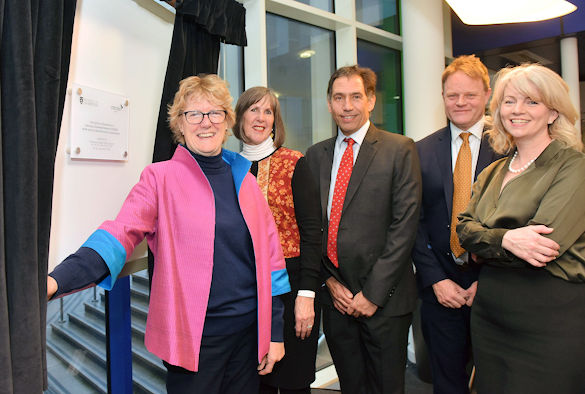
L-R: Professor Dame Sally Davies, Professor Dame Janet Beer, Professor David Lalloo, Professor William Hope and Professor Louise Kenny.
Centre of Excellence in Infectious Diseases Research (CEIDR) - Next important phase in infectious diseases research in Liverpool launched.
Professor Dame Sally Davies, former Chief Medical Officer and current UK Special Envoy on Antimicrobial Resistance, visited Liverpool 22 January 2020 to help launch an ambitious new programme of AMR research at the University of Liverpool and Liverpool School of Tropical Medicine (LSTM).
As part of an ambitious new chapter for their Centre of Excellence in Infectious Diseases Research (CEIDR), the two institutions are stepping up efforts to tackle the AMR crisis and its impact on human health in Liverpool, the UK and globally.
During her visit, Dame Sally unveiled a plaque marking CEIDR’s new £3.5m National Institute for Health Research (NIHR) Antimicrobial Resistance Laboratories. These state-of-the art laboratories will provide the infrastructure needed for Liverpool researchers to develop personalised antimicrobial therapies to prevent and treat AMR.
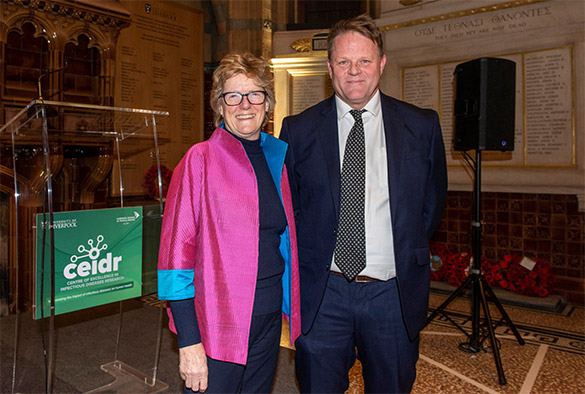
Professor Dame Sally Davies & Professor William Hope celebrate the foundation of the Dame Sally Davies Chair in antimicrobial research awarded to Professor William Hope.
Professor William Hope, Dame Sally Davies Chair in Antimicrobial Resistance at the University of Liverpool, has been appointed as CEIDR’s new academic Centre Director. With expertise covering drugs and antimicrobials, diagnostics, vector control products and vaccines, Dr Fiona Marston will continue to lead the centre’s well-established industrial partnership programme under the new name of CEIDR Innovations.
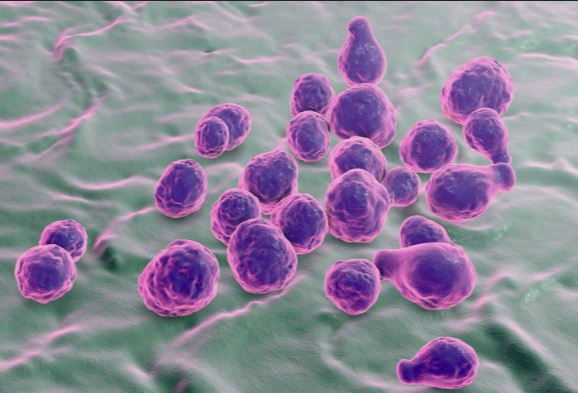
Current treatment for fungal meningitis is fuelling drug resistance
Our research shows a common first-line treatment approach for cryptococcal meningitis in low-income countries is being compromised by the emergence of drug resistance.
William Hope is speaking at the Colston Research Society Symposium on Antimicrobial resistance - in Bristol 14th November -‘Individualisation of antimicrobial therapy to prevent and treat AMR’.
William Hope and Shampa Das are both presenting at British Society for Antimicrobial Chemotherapy (BSAC) conference -‘Meeting the Challenges of Gram-Negative Infection Management’ on 19th November 2019 in London. William on ‘PK-PD challenges for Gram-negative infections’ and Shampa ‘Advances in betalactamase inhibition in difficult to treat infections’.
Dr Kat Stott one of our clinical PhD fellows, returns to Liverpool this month from Malawi. Kat has had a very successful 2 years in Malawi recruiting patients with cryptococcal meningitis to a pharmacokinetic-pharmacodynamic (PK-PD) substudy of the Ambition-cm trial (ISRCTN72509687). Ambition-cm examines whether a novel drug regimen for cryptococcal meningitis may be non-inferior to standard of care. Together with the local study team, Kat has successfully reached her recruitment target of 65 patients. Samples are awaiting shipment back to the University of Liverpool for PK analysis and whole genome sequencing, and to Duke University in North Carolina for pathogen phenotyping and transcriptomic analysis. Further samples will stay in Malawi and undergo immunological analyses at the Malawi-Liverpool Wellcome Trust Clinical Research Programme, to examine the impact of host immunity on PD outcomes.
Dr Shampa Das appointed to European Antimicrobial Resistance research steering group
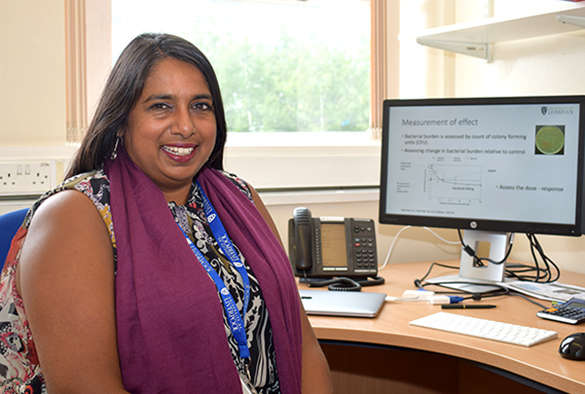
Dr Shampa Das, Senior Lecturer in Antimicrobial Pharmacodynamics (PD) from the University’s Department of Molecular and Clinical Pharmacology, has been appointed to join the European Committee on Antimicrobial Susceptibility Testing (EUCAST) Steering Committee as a PK/PD expert.
EUCAST was launched in 1997 in order determine, review and revise European clinical breakpoints, the concentration of an antibiotic which defines where a bacterium is susceptible or resistant, in close collaboration with the European Medicines Agency (EMA) and European Centre for Disease Prevention and Control (ECDC).
Dr Das will be a member of EUCAST’s Steering Committee. She has previously been employed as a Director of Clinical Pharmacology at the Antibiotics Unit, AstraZeneca. She has vast experience with drug development, preclinical PK/PD and clinical support to aid optimal dose selection, as well as extensive experience with the regulatory process.
Of the appointment Dr Das said: “I am proud and privileged to have been appointed to this prestigious position. A critical aspect of preventing emergence of resistance is to ensure that antibiotics are dosed correctly.
“EUCAST is a highly respected organisation and I am delighted to be able to support them in promoting education and training in antimicrobial susceptibility testing.”
More information about EUCAST can be found here http://www.eucast.org/organization/
2019 ASM/ESCMID Conference on Drug Development to Meet the Challenge of Antimicrobial Resistance September 3-6, 2019 | Boston, Massachusetts
ASM ESCMID POSTER PRESENTATIONS
- Pharmacodynamics of SPR206 in Murine Models of Infection Against Multi‐Drug Resistant (MDR) Gram‐Negative Bacteria
L. Mcentee, A. Johnson, N. Farrington, A. Kirb1, T. Lister, T. Parr, N. Cotroneo, S. Das, W. Hope; - Pharmacokinetic and Pharmacodynamic Analysis of Cefepime and AAI101 against Multidrug‐Resistant Enterobacteriaceae
A. Johnson, N. Farrington, L. McEntee, P. Knechtle, S. Biondi, S. Shapiro, S.Das, W. Hope; - Phase III Dose Selection for Tebipenem‐Pivoxil Hydrobromide, a Novel Oral Carbapenem
S. Das, M. Laura, A. Johnson, N. Farrington, S. Gore, A. Kirby, A. Jai2, D.Melnick, T. Parr, W. Hope; - Development of an Experimental Model of Bacterial Meningoencephalitisto Facilitate Antimicrobial Drug Development for Neonates
N. Farrington, L. McEntee, A. Johnson, A. Kirby, S. Gore, R. Greenberg, S.Das, W. Hope;
Nikki Farrington received a travel award to attend based on the scientific quality of her abstract.
William Hope & Shampa Das are also moderating the following sessions:
- Pre-Clinical and Clinical Considerations for the Development of Antifungal Agents
- Lecture: Creating a Sustainable Antibiotics R&D Ecosystem
- Keynote Lecture: Investor Sentiment: How Did We Get Grand Ballroom Here and is There a Way Out?
- Pre-Clinical and Clinical Considerations for the Development of Antifungal Agents
- Keynote Lecture: Beta-Lactamase Inhibitors: A Journey of Discovery
University joins new antimicrobial resistance consortium
Our researchers have joined a new consortium to help in the development of novel antibacterial agents to battle antimicrobial resistance in gram-negative bacteria.
Liverpool lead Dr Shampa Das, Senior Lecturer in Antimicrobial Pharmacodynamics, said: “A critical aspect of preventing emergence of resistance is to ensure that antibiotics are dosed correctly. We will use experimental infection models with mathematical computation to explore the relationship between the amount of drug given, antimicrobial effect and prevention of resistance emergence and use this to optimise the clinical dose regimen.”
Unique Liverpool Summer School welcomes delegates from around the world.
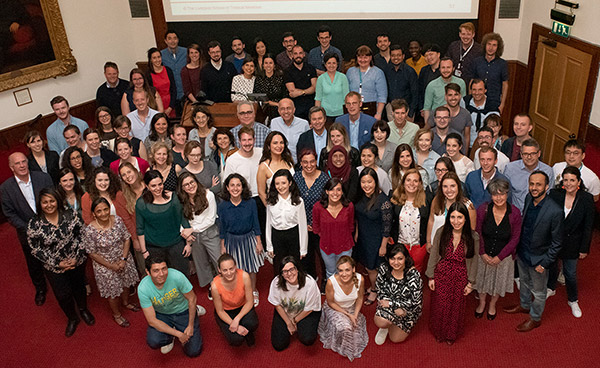
The University of Liverpool and the Liverpool School of Tropical Medicine (LSTM) welcomed delegates from 26 countries to this year’s European Society of Clinical Microbiology and Infectious Diseases (ESCMID) Summer School.
ESCMID is a non-profit organization whose mission is to improve the diagnosis, treatment and prevention of infection-related diseases. Every year the organisation runs a week-long programme that covers a broad range of topics in clinical microbiology and infectious diseases.
This year the 18th ESCMID Summer School took place in Liverpool between 29 June – 5 July. The Summer School Co-ordinators this year were Professor William Hope from the University of Liverpool and Professor Nick Beeching from LSTM. The event was sponsored by Liverpool based Centre of Excellence in Infectious Diseases Research (CEIDR).
£300k awarded for new translational research projects by CEIDR.
The Liverpool Centre of Excellence in Infectious Diseases Research (CEIDR) has awarded £300,000 to support seven new collaborative translational projects from its Translational Pump Priming (CEIDR TPP) fund.
£3.54m boost for Liverpool based Antimicrobial Resistance research.
The University of Liverpool and the Liverpool School of Tropical Medicine (LSTM) have been awarded £3.54m for a research project that aims to develop a ‘personalised health’ approach to prevent and treat antimicrobial resistance (AMR).
We have developed a new treatment option for Multi-Drug Resistant Infections.
MRC Showcase Day
Dr Sara Boyd & Dr Christopher Darlow presented at the North West England MRC Fellowship Scheme in Clinical Pharmacology and Therapeutics Annual Showcase on 15 May 2019, Hilton Hotel, Manchester Airport, UK.
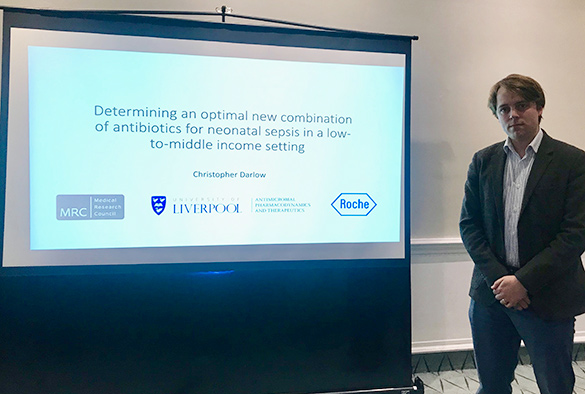
Dr Christopher Darlow: 'Determining an optimal new combination of antibiotics for neonatal sep-sis in a low-to-middle –income setting'
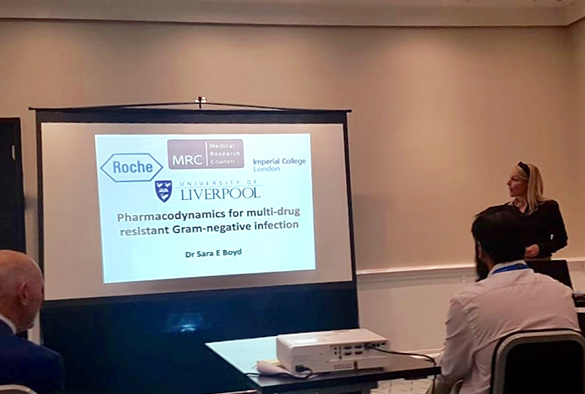
Dr Sara Boyd: 'Pharmacodynamics for multidrug-resistant Gram-negative infections'
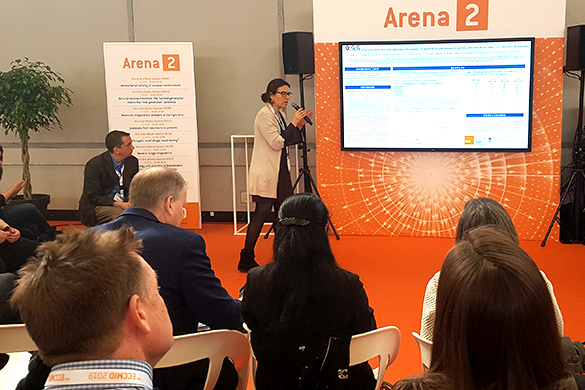
Sonia Luque (Honorary Staff member) presenting at ECCMID (16/4/19)– title ‘Population pharmacokinetics and pharmacodynamics of anidulafungin against Candida albicans in a cohort of critically ill patients’.
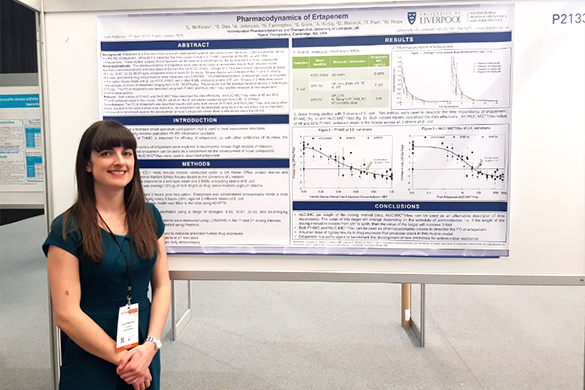
Laura McEntee presenting poster at ECCMID (15/4/19) title ‘Pharmacodynamics of ertapenem’ in ‘Preclinical PD assessment of antibacterial agents’ session.
Registration now open for ESCMID Summer School in Liverpool.

Registration is now open for this prestigious week long course dedicated to postgraduate and continuing medical education, being hosted by the University of Liverpool and the Liverpool School of Tropical Medicine.
The European Society of Clinical Microbiology and Infectious Diseases (ESCMID) is a non-profit organization whose mission is to improve the diagnosis, treatment and prevention of infection-related diseases. Every year the organisation runs a week-long programme that covers a broad range of topics in clinical microbiology and infectious diseases.
This year will see the 18th ESCMID Summer School taking place in Liverpool between 29 June – 5 July. The course will interest young MDs at the end of their specialty training as well as biologists, pharmacists, PhD students and postdoctoral fellows working in the infection field. The scientific programme of classical lectures is complimented by interactive workshops.
The ESCMID Summer School Co-ordinators this year are Professor William Hope from the University of Liverpool and Professor Nick Beeching from LSTM.
Since its founding in 1983, ESCMID has evolved to become Europe’s leading society in clinical microbiology and infectious diseases with members from all European countries and all continents. For more than 30 years, ESCMID has been an influential component in the professional lives of microbiologists and infectious disease specialists and now reaches more than 7,000 individual and 30,000 affiliated members around the world. ESCMID, based in Basel, Switzerland, welcomes new colleagues from all nations.
Of the course Professor William Hope, said: “It is an honour to be hosting the ESCMID Summer School which is one of the best and comprehensive courses that defines the state-of-the-art in clinical infectious diseases and microbiology.”
Dr Nick Beeching, said: “We are delighted to host this prestigious course in Liverpool, with the chance for trainees to interact with Faculty members from all over Europe.”
More details about the course and how to register can be found here.
Members of the APT team will be speaking/presenting posters at ECCMID (European Congress of Clinical Microbiology & Infectious Diseases), Amsterdam 13 - 16 April 2019:
- William Hope speaking on - ‘Novel antifungals and how they might address some of the current treatment challenges’
- William Hope co-chairing a session on ‘Issues in antifungal treatment’ with Anna Skiada (Athens, Greece)
- Shampa Das – presenting a poster –‘ Phase III dose selection for tebipenem’ in the ‘Recent research on the pharmacokinetics and safety of antibacterial agents’ session.
- Laura McEntee – presenting a poster – ‘Pharmacodynamics of ertapenem’ in ‘Preclinical PD assessment of antibacterial agents’ session.
- Sonia Luque (Honorary staff member) - presenting a poster – ‘Population pharmacokinetics and pharmacodynamics of anidulafungin against Candida albicans in a cohort of critically ill patients’.
Members of the APT team are attending the ‘Antimicrobial Resistance – preventing an antibiotic apocalypse’ conference hosted by The Economist on March 26 2019 – Keynote speaker Dame Sally Davies.
Professor William Hope presented at the 'Superbugs and Superdrugs 2019' Confernence London, UK, 13 March 2019. The slides are available for download.
Pharmacodynamics to Accelerate Antimicrobial Drug Development for AMR
At the recent British Ssociety for Antimicrobial Chemotherapy (BSAC) – Antimicrobial Chemotherapy Conference in London - 15th January 2019.
, Senior Lecturer, Molecular and Clinical Pharmacology spoke on Tackling Beta-lactamase mediated resistance: A potted history of beta lactamase and lessons from recent development of beta-lactamase inhibiter combinations.
Beta-lactams have long been an essential tool in the armamentarium for the treatment of infections. However, resistance to beta-lactams through the emergence of beta-lactamases is becoming a serious threat to their continued utility. Beta-lactamase inhibitors were developed to overcome this problem, however, the spectrum of coverage against the different beta-lactamases and emerging resistance to beta-lactamase inhibitors is a continuing problem. The challenges of developing beta-lactam-beta-lactamase inhibitor combinations were discussed.
Adam Johnson, Senior Research Assistant, Molecular and Clinical Pharmacology ran an interactive workshop discussing the importance of HOLLOW FIBRE INFECTION MODEL (HFIM) use in pre-clinical research. Predominantly used to assess humanized Pharmacokinetic and Pharmacodynamic (PK-PD) relationships and the importance of this data in drug development for evaluation by regulatory agencies in approval decisions.
Research collaboration seeks to address deaths in newborns from sepsis.
The University of Liverpool has signed a collaborative research agreement with the Global Antibiotic Research and Development Partnership (GARDP) in a bid to develop new treatment options for newborns with sepsis. The research seeks to explore the correct dose and frequency of potential antibiotic combinations that could improve treatment outcomes in this vulnerable population. Read More.
Prof William Hope will speak at the 'Mycoses Study Group Education and Research Consortium (MSGERC) 2018 Biennial Meeting' 26th September 18 – Montana, USA on ‘New Treatments for Cryptococcosis ‘
Dr Sara Boyd, Adam Johnson and Laura McEntee attended the European Society of Clinical Microbiology and Infectious Diseases (ESCMID) / American Society of Microbiology (ASM) Conference on Drug Development to Meet the Challenge of Antimicrobial Resistance in Lisbon, September 2018.
Dr Sara Boyd, MRC Clinical Innovation Fellow, gave the Young Investigator Lecture at the European Society of Clinical Microbiology and Infectious Diseases (ESCMID) / American Society of Microbiology (ASM) Conference on Drug Development to Meet the Challenge of Antimicrobial Resistance. Her lecture was titled Metallobetalactamases (Epidemiology, Drug Design, Diagnosis and Treatment).
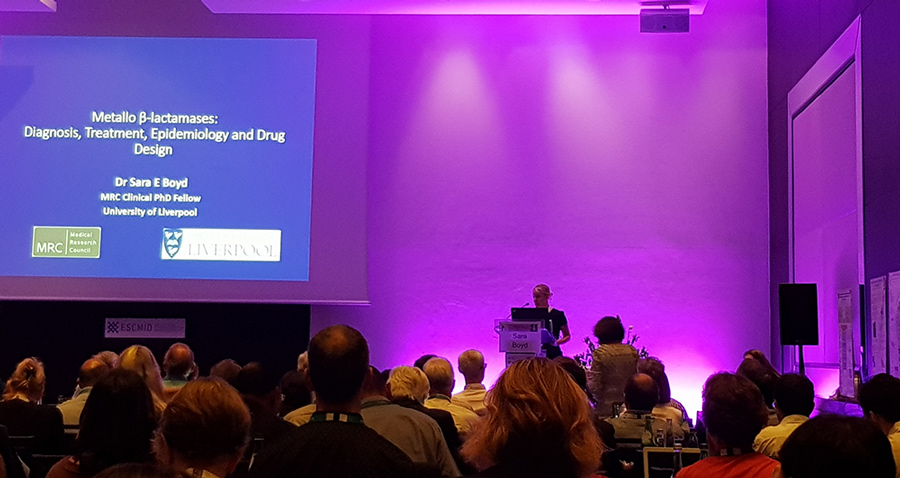
Adam Johnson presented a poster - Abstract Title: Pharmacokinetics and Pharmacodynamics of Tebipenem (SPR859) for Multidrug Resistant Enterobacteriaceae in a Hollow Fibre Infection Model
Laura McEntee presented a poster - Abstract Title: Pharmacokinetics and Pharmacodynamics of Tebipenem for Multidrug Resistant Enterobacteriaceae.
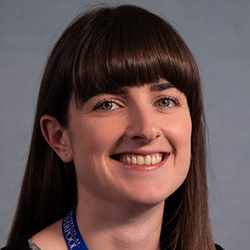
Laura McEntee attended the American Society of Microbiology (ASM) Microbe conference in Atlanta USA on 8th June 2018. Laura presented data on Spero's new compound and gave an oral and poster presentation entitled 'Pharmacokinetics and Pharmacodynamics of Tebipenem for Multi-drug Resistant Enterobacteriaceae'.
ESCMID/ASM Conference on Drug Development to Meet the Challenge of Antimicrobial Resistance
Lisbon, Portugal
4 – 7 September 2018
Antimicrobial drug resistance remains a pressing public health problem. There has been a resurgence in interest in tackling AMR.
This conference focusses on the development of new antimicrobial agents for AMR. It is a multidisciplinary meeting that involves basic scientists, clinical academics, regulatory bodies, funding bodies and the pharmaceutical industry. Its scope
stretches from chemistry to clinical development, from neonates to adults, from bacteria to fungi – all with a global perspective.
The meeting is practical, interactive with plenty of time for networking. We will happily accept original data for poster and platform presentations. We are also especially interested in supporting young investigators and researchers from low to middle income countries.
Back to: Institute of Systems, Molecular and Integrative Biology
